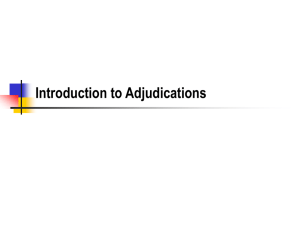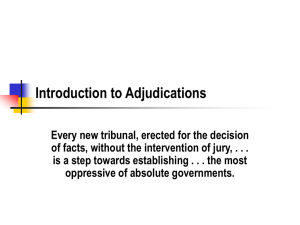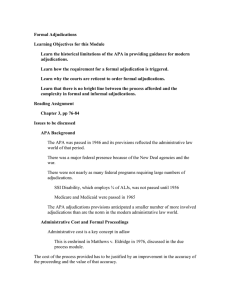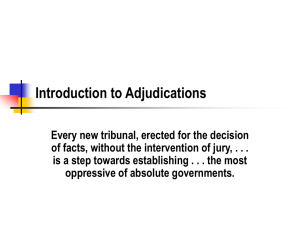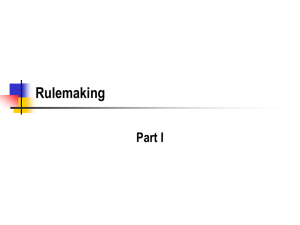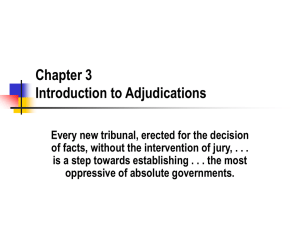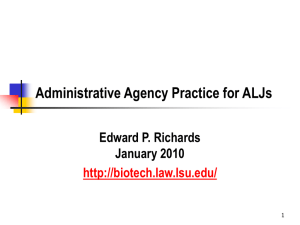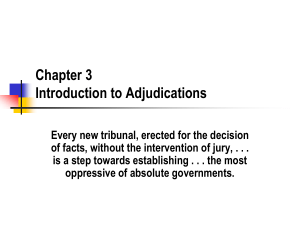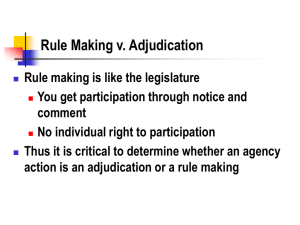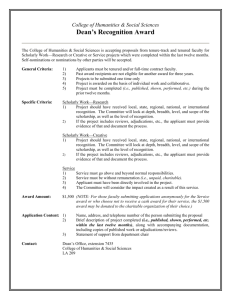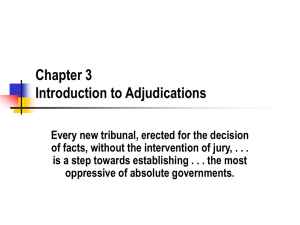Chapter 3 Introduction to Adjudications
advertisement
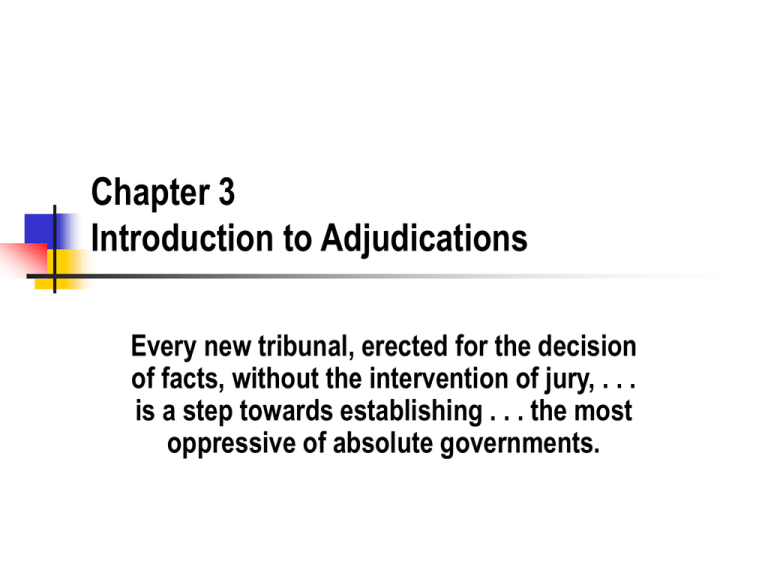
Chapter 3 Introduction to Adjudications Every new tribunal, erected for the decision of facts, without the intervention of jury, . . . is a step towards establishing . . . the most oppressive of absolute governments. Evolution of Adjudications What types of disputes were early courts (1400s) concerned with? What is at issue in many modern administrative adjudications that is fundamentally different from the cases in 1400? Why does this make juries less effective? When is this a problem in Article III trials? Defining an Adjudication Adjudications are the process used to make an order, other than rulemaking What are examples of adjudications? Why is your federal student loan application an adjudication? What is the order? Other examples? Purposes of Orders Allocate benefits Stop unlawful activities Setting Policy - California Dental Association What did the FTC accuse the CDA of? What was the sequence of the agency review? What court was this appealed to? Why do think agency rulings are appealed to the Circuit courts rather than district courts? How does this adjudication set national policy? How is this like common law precedent? Licensing as an Adjudication Wetlands development requires a permit from the Army Corps of Engineers The developer must submit proof that the land to be developed is not a wetland, or, if it is, that there will be appropriate mitigation The Corps evaluates the application and makes a decision, which can then be appealed within to a Corps appeals board If the application meets the standards, the Corps will issue a permit Inspections as Adjudications Restaurants need a food handling permit to sell to prepare food and sell it to the public Must show that you have the proper equipment Must show proper training for employees These permits provide for surprise inspections to assure that the conditions are still being met The inspector views the facts The owner can provide input during the inspection The inspector provides written findings APA Provisions Formal (APA) Adjudications under the US APA US - 554, et seq. Louisiana Provisions LA - 955, et seq. Formal (APA) v. Informal (Non-APA) Adjudications What is the language in 554 that triggers a formal adjudication? "on the record after opportunity for an agency hearing" What are the subsequent provisions this triggers? Why do we call informal adjudications non-APA adjudications? Costs of Formal Adjudications Monetary costs are high Time costs are high They reduce agency flexibility Why might you want one for your client? Why are administrative costs useful to lawyers? Administrative Cost and Formal Adjudications Administrative cost is a key concept in adlaw Administrative agencies carry out huge numbers of adjudications What would it cost if each of these looked like a trial? What sort of delays would you expect? What if FEMA used trials to decide on compensation checks? This is revisited next chapter in the tension between due process and agency costs Judicial Limitations on Formal Adjudications Most of the circuits and the United States Supreme Court are reticent to order formal adjudications. Practice issues The book spends a lot of time on examples of arguments for and against the court ordering a formal adjudication You do not need this level of detail In practice, if the issue has not been settled for your hearing type, this can be an important dilatory practice It can also be important if you want to intervene Practical Considerations in Adjudications Within the constraint posed by APA for formal adjudications, which is still more informal than a trial, the agency can set their own procedures Some agencies have developed rules based on the Federal Rules of Civil Procedure and Evidence, which make their hearings look like trials. As we will discuss latter, even if the proceeding looks like a trial, the ALJ's power is much more limited than that of an Article III judge. Types of Informal Adjudications Social security disability determinations Federal student loans Medicaid eligibility determinations In general, all government legal determinations based on specific facts that are not judicial decisions are adjudications Rules that apply generally, even if the class of parties is very small, are not adjudications. The Nature of the Agency and Formality of the Process The broader the reach of the agency actions and the more controversial the agency function, the more formal the agency tends to me. Social Security Disability deals with individuals and their decisions do not reflect policy Department of Labor adjudications set policy for unionization for whole industries It usually does not use rules for these questions, so adjudications are even more important Notice What is notice? Why is it required? What has to be provided in the notice? What can complicate notice? What about in immigration? Welfare benefits? Burden and Standard of Proof Who has the burden of proof in an administrative proceeding? What is the Social Security Disability example? What is the order in this example? What is the standard of proof required in an agency proceeding, unless otherwise specified in the law? Are there other standards in administrative proceedings? The United States Supreme Court has upheld a clear and convincing standard in mental health Rules of Evidence in Administrative Proceedings (Formal and Informal) What is the purpose of the rules of evidence in Article III trials? What is the underlying theory of the rules? How does this change when there is no jury? Why would this be different in an inquisitorial proceeding? Does the APA set the standard of evidence? Do all agencies use the same standards? Hearsay What is hearsay? Why is it excluded in the rules of evidence, except for the zillion exceptions? Why would the hearsay rule not be as important in an agency proceeding? What was the Residuum Rule? This has been replaced by the "substantial evidence" standard used for all agency evidence LA uses "sufficient evidence" - may not be the same standard.
